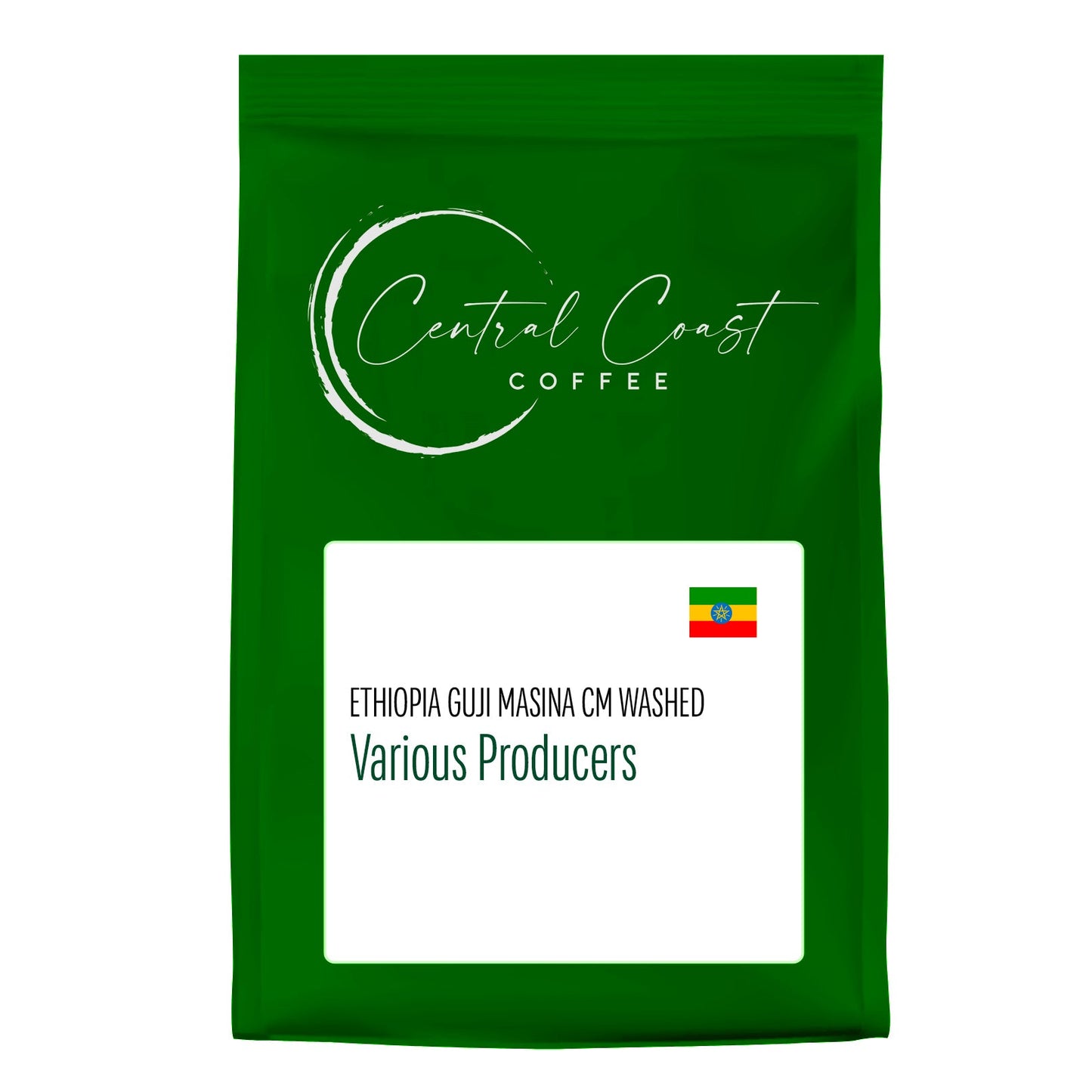
Are you looking to buy Ethiopian | Guji Masina | Various Producers | CM Washed CMW Diamond 1424 | Signature Series in Australia?
-
Tasting Notes/Sensory: Caramel, Juicy, Peach, Toffee, Floral, Bright, Stone Fruit, Silky, Confectionary, Whiter sugar, Orange candy, Velvety
SCA Score: N/A
Suitable with Milk? TBA
Roast Level: Medium
Roasted Level Suits: FILTERPROCESSING: CM Washed
VARIETAL: Heirloom
Farm: Oromia
Origin: Woreda Adola – This coffee hails from the Adola district in Ethiopia’s southern Oromia region, an area celebrated for its rich, fertile soil and perfect growing conditions for coffee. The Adola region produces beans with complex flavor profiles and vibrant acidity, offering a true taste of Ethiopian coffee craftsmanship.Region: Guji, Kebele Masina, Oromia – Sourced from the Masina kebele, a small farming community within the Adola Woreda in the Guji zone of Ethiopia’s Oromia region, this coffee embodies the unique characteristics of this renowned coffee-growing area. The Guji zone is celebrated for its high-altitude farms and vibrant, complex coffees. The farmers in Masina are known for their dedication to sustainable farming practices, contributing to the exceptional quality and flavor of the beans. Guji coffees often showcase a balance of bright acidity, floral notes, and fruity undertones, making them a standout choice for coffee enthusiasts.
ALTITUDE: 1950-2300 MASL
HARVEST MONTHS: DECEMBER 2024Import Partner: Project Origin
More Info About This Coffee
- Coffees grow in small farmers backyards, known as “garden coffee”
- Hand sorting of only ripe, red cherries at 20-22º Brix o Cherries are placed inside sealed tanks and filled with CO2 pushing oxygen out
- Controlled yeast activity, temperature and humidity of tank
- Anaerobic fermentation time creates a Diamond profile that is delicate, structured, and refined
- Beans are washed before being laid on beds to dry
- Drying takes typically 15-20 days
- Our local partners do further quality control. As a minimum, a triple pass through a colour sorter and a triple-pass through hand-sorting tables
More About The Masina Kebele
In the Masina Kebele in the Adola Woreda lies a washing station that sits at the heart of Project Origin. Built in 2017 as a joint project with our great local export partners, Primrose, the Guji Masina washing station was the site where our very first Ethiopian Carbonic Maceration processed coffees were produced. We learned a vast amount from the experience of trying and refining the CM
process at this station. Nearby the washing station lies a river, that locals in the community wade through to reach the town and the school. Project Origin have teamed up with Primrose once again to fund the construction of a bridge over this beautiful river, hoping that this improvement in infrastructure will help the community in their daily travels and needs rather than taking the 1-2 hour walk around to the
nearest crossing. The coffees from this woreda are already world-known, feeding into the romanticism of Ethiopian coffees, and when the 2018 World Barista Championship is won utilising a coffee from this station, it becomes impossible not to include this washing station in your collection.
Coffee in Ethiopia:
While Ethiopia is famous as coffee’s birthplace, today it remains a specialty coffee industry darling for its incredible variety of flavors. While full traceability has been difficult in recent history, new regulations have made direct purchasing possible. We’re partnering directly with farmers to help them produce top quality specialty lots that are now completely traceable, adding value for farmers and roasters, alike.
The exceptional quality of Ethiopian coffee is due to a combination of factors. The genetic diversity of coffee varieties means that we find a diversity of flavor, even between (or within) farms with similar growing conditions and processing. In addition to varieties, processing methods also contribute to end quality. The final key ingredients for excellent coffee in Ethiopia are the producing traditions that have created the genetic diversity, processing infrastructure and great coffee we enjoy today.
Most producers in Ethiopia are smallholders, and the majority continue to cultivate coffee using traditional methods. As a result, most coffee is grown with no chemical fertilizer or pesticide use. Coffee is almost entirely cultivated, harvested and dried using manual systems.
SKU: eth_masina_nat_160g
Package Weight: 200g
How does my coffee come packaged?
Despite some of our product images looking very fancy our coffee is packaged into a plain brown paper foiled lined bag with a Swiss WIPF degassing valve. This offers superior oxygen and moisture protection. We recommend once you crack the seal you store your coffee in AirScape containers or Weber Workshop Bean Cellars for a single dosing option.
You can also freeze/vacuum seal in small lots, then use straight away once removed from freezer.
We don't have fancy printed bags with ziplocks (more plastic), we save that cost and buy better quality green beans so you can focus on your cup quality instead of fancy marketing and artwork.

